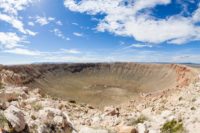Unscrambling the clues at a fossil site in Argentina which contains thousands of yet-to-be-hatched dinosaurs that have been quickly buried. …read more Source: creation.com
A sneak preview of the editorial from the soon-to-be-released Creation magazine. Subscribers will be delighted with the magazine’s powerful content and brilliant graphics. …read more Source: creation.com
A guest column by a pastor that took biblical creationists, in particular AiG President Ken Ham, to task for supposedly being antiscience, appeared recently in a Holland, Michigan, newspaper. In Ken’s absence (he has been in England to speak at a conference), we asked our astronomer Dr. Danny Faulkner (who eventually joined Ken in England) to respond on Ken’s behalf. It made sense too because Dr. Faulkner’s PhD in astronomy made him highly qualified to address the contents of the pastor’s column. However, the managing editor told us that the newspaper has a policy of “not print[ing] letters to [More]
By Sarah Chaffee On this episode of ID the Future, hear part 2 of a lecture given by David Snoke at a conference sponsored by the Christian Scientific Society. In this segment, Dr. Snoke, professor of physics and astronomy at the University of Pittsburg, discusses the relationship between information and entropy. Your browser does not support playing Audio, please upgrade your browser or find our podcast on podOmatic Download Episode …read more Source: id the future
By Creation Moments The Solar System has seen many impacts. On so many bodies of the Solar System, these impacts have produced craters. It is well known that the surface of the Moon contains many craters, which are thought to have been formed when a meteorite hit the Lunar surface. However, the Moon is not alone. read more …read more Source: Creation Moments
Our Western cultures no longer value human life as they once did. The unborn, the disabled, the elderly, and the terminally ill are increasingly viewed as burdens on society instead of having intrinsic value simply because they are humans, made in the very image of God (Genesis 1:27). A recent article in New Scientist reminded me of this truth. This article was called “Life Extension May Prove to Be a Double-Edged Sword.” The subtitle read, “Today’s middle aged people could routinely live to 120 or more. That means we have time to prepare.” The article claims that antiaging research [More]
A refreshing assessment of Genesis that biblical creationists should find useful. …read more Source: creation.com
A drop of rain brings on an explosive reaction that leads to new life. …read more Source: creation.com
By kpennock On this episode of ID the Future, to celebrate Michael Denton’s newest book, The Wonder of Water, we bring you a conversation between Ray Bohlin and Howard Glicksman on the body’s wondrous control systems for using water. Dr. Glicksman is a medical doctor and author of an extended series of posts at Evolution News & Science Today, “The Designed Body.” Your browser does not support playing Audio, please upgrade your browser or find our podcast on podOmatic Download Episode …read more Source: id the future
Five hundred years ago this month, the Reformation was initiated by a German priest and professor named Martin Luther and continued by others such as Calvin and Zwingli. Luther’s nailing of his famed 95 Theses to a church door in Wittenberg began the Reformation in October 1517. It was a movement that called the church back to the authority of God and away from the fallible opinions of man, which had severely compromised the clear teaching of the Word of God. The Bible-upholding movement was so powerful that today we are still experiencing the effects of this historical earthquake [More]
We help a questioner think through an unusual question within a biblical framework. …read more Source: creation.com
By Sarah Chaffee On this episode of ID the Future, we continue to celebrate geneticist Michael Denton’s new book, The Wonder of Water, with this reposted interview where Denton reflects on the concept of bottom-up, versus top-down, causation, and which is the better explanation for the world we live in. Your browser does not support playing Audio, please upgrade your browser or find our podcast on podOmatic Download Episode …read more Source: id the future
By kpennock An actor in Hollywood raises the important question of when people should and shouldn’t be skeptical of claims made in the name of science, inspiring a response from political scientist John West, author of Darwin Day in America. This conversation was taped live in Hollywood during a discussion after the final performance of Disinherit the Wind, a play that tells the story of a neurobiologist who sues his university for the right to challenge neo-Darwinian evolution. Your browser does not support playing Audio, please upgrade your browser or find our podcast on podOmatic Download Episode …read more Source: [More]
On this day in 1517—exactly 500 years ago—the church and culture were changed forever when a defiant monk nailed his 95 Theses to the door of Castle Church in Wittenberg, Germany. This act by Martin Luther is considered the beginning of the Protestant Reformation, a period that would radically reform the church as she returned to God’s Word, not man’s tradition, as the authority for life and practice. A World Primed for Reform Much has changed over the five centuries since Luther’s bold stance on God’s Word. But the world of Luther is one that parallels our own in [More]
Editor’s Note: First published in St. Louis MetroVoice 5, no. 2 (February 1995). The bitterest pill to swallow for any Christian who attempts to “make peace” with Darwin is the presumed animal ancestry of man. Even many Christians who uncritically accept evolutionary dogma as “God’s way of creating” try to elevate man and his origin above that of the beasts. Evolutionists attempt to soften the blow by assuring us that man didn’t exactly evolve from apes (tailless monkeys) but rather from ape-like creatures. This is mere semantics, as may be seen from the fact that many of the [More]
Most evolutionary astronomers talk about the Oort cloud like it’s a fact. Yet they admit no direct observational evidence exists. Shop Now When I was growing up, the definition of science was simple: “the study of the natural world using the five senses.” This definition placed some limits upon science. For instance, science was restricted to the study of the natural world, so anything supernatural was out of bounds to science. Supernatural things include miracles, angels, souls, and God. Even if something is part of the natural world, it wasn’t considered scientific unless we could detect it with our [More]
By Creation Moments London’s famous Natural History Museum features an enormous gallery, where, among other large creatures, you can see a life-size blue whale hanging from the ceiling. read more …read more Source: Creation Moments
Want to do scientific research that doesn’t agree with the cultural narrative? Well, apparently you shouldn’t even bother. Reportedly Bath Spa University in the UK turned down a research application on gender reassignment reversal for being “potentially politically incorrect” and because of its potential to be lambasted on social media, and the university with it. So the scientific study doesn’t matter—what matters is what people already believe and making sure “science” stays in agreement with the status quo, particularly regarding the gender issue. “It’s Better Not to Offend People” James Caspian is a psychotherapist whose specialty is working [More]
On October 16, 2017, two press conferences generated much interest when they announced the detection of two neutron stars merging. What particularly caught the public’s attention was the claim that this event produced perhaps 10 times the earth’s mass in gold. How much of this story is established fact and what parts are conjectures? And what does this mean? Let me sort through this. Read More: Spinning Stardust into Gold | Answers in Genesis
Hell ants may have skewered prey with vampire-like scythes to drain their “bug blood.” Locked in amber around the world are countless tiny flowers and small animals ranging from insects to lizards. Among these are hell ants—extinct ants with scythe-like jaws that moved upward in a vertical plane rather than horizontally. However fearsome these sound, you might well wonder how such an ant could eat. Detailed images of a newly discovered species of hell ant in Burmese amber may hold the answer. All living ants—and lots of fossilized ones—have pincer-like mandibles that converge in front of the face. Their [More]
By Creation Moments One highly qualified British creationist scientist related to an audience how another scientist has approached him, to help with a course he thought their university should run, about the problems associated with evolution. My friend said he would be happy to help. A few days later, the other scientist returned sheepishly to my friend. He would not, after all, be able to run the course. read more …read more Source: Creation Moments
Want a family vacation that combines hands-on STEM (science, technology, engineering, and mathematics) activities, robotics, the Creation Museum, stargazing, and family fun together? Look no farther than Ci 5.0 Family STEM Camp with our friends at Camp Infinity. If you have a young person in your family who loves STEM, you’ll want to bring them to Ci’s Family STEM Camp. The camp director, Dan Wooster (who also serves on the Answers in Genesis board), has found that many parents don’t understand the world of STEM that has perhaps captured their young person. These parents want to better connect with [More]
Editor’s Note: First published in St. Louis MetroVoice 5, no. 3 (March 1995). The evolutionist’s notion that man evolved by chance from ape-like creatures is largely based upon certain anatomical similarities between apes and men. Being convinced that such similarities “prove” an evolutionary relationship, paleoanthropologists have declared certain fossil apes to be particularly “manlike” and, thus, ancestral to man. Similarly, in an effort to fill the gap between apes and men, certain fossil men have been declared to be “apelike” and, thus, ancestral to at least “modern” man. You might say this latter effort seeks to make a “monkey” [More]
Modern advances in computers have taken artificial intelligence to stunning new levels. If computers can learn and think better than we can, will that threaten our humanity? I still remember the day as a 10-year-old boy that I got my first calculator—with memory. I’ve loved computers ever since, creating things using logic. The very first program I created allowed me to play baseball against the computer. While the interface was pretty simple, it helped me understand how well machines follow exact instructions. How times have changed. Back then we were inspired watching Rosie the Robot on The Jetsons [More]
By Creation Moments When I was a science teacher, in government schools in England, I used to like to show a particular video to my classes. This video featured some unusual plants that had strange reproductive methods. The most unusual of all was the bucket orchid. read more …read more Source: Creation Moments
Truth and apologetics teaching is headed out to mailboxes around the world—don’t miss out! Answers magazine is an award-winning, bimonthly family publication packed with solid apologetics content you won’t find anywhere else. Here’s a sneak peek at some of what you can expect in the November issue. Discover how hybrids such as zonkeys, ligers, and wholphins are shaking up the evolutionary tree of life—and confirming the biblical view of speciation. Read More: Gene Editing, Hybrid Species, and Distant Starlight—Get Equipped! | Answers in Genesis
Editor’s Note: First published in St. Louis MetroVoice 5, no. 5 (May 1995). Evolutionism is a belief system based upon the assumption that there is a purely materialistic explanation for the origin of virtually everything that ever has existed or ever will exist. The essential feature of this belief (often called materialism) is that everything in nature arose spontaneously by a process of self-transformation without the necessity of supernatural intervention. Julian Huxley once said, The whole of reality is evolution, a single process of self-transformation (Evolution and Genetics, Simon & Shuster, 1955, p. 278). In today’s public [More]


























